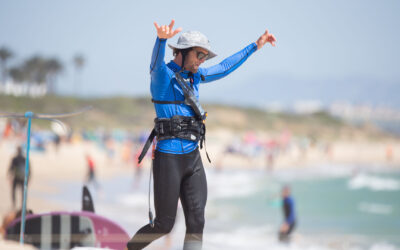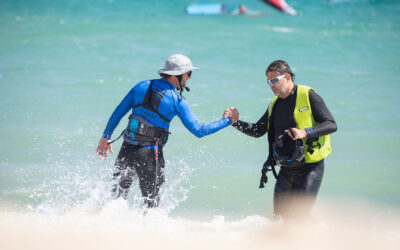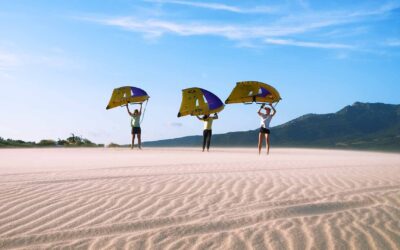Windsurfing courses for beginners to advanced
Windsurfing appeared in the 70’s and became well known on our beaches in the 80’s. It is THE sailing medium that has become accessible to all, long before kitesurfing and today wingfoil, a leisure activity for some during the summer, and a fully-fledged passion for others. Beginning windsurfing or improving your skills is easy as windsurfing schools have become numerous all over the world.
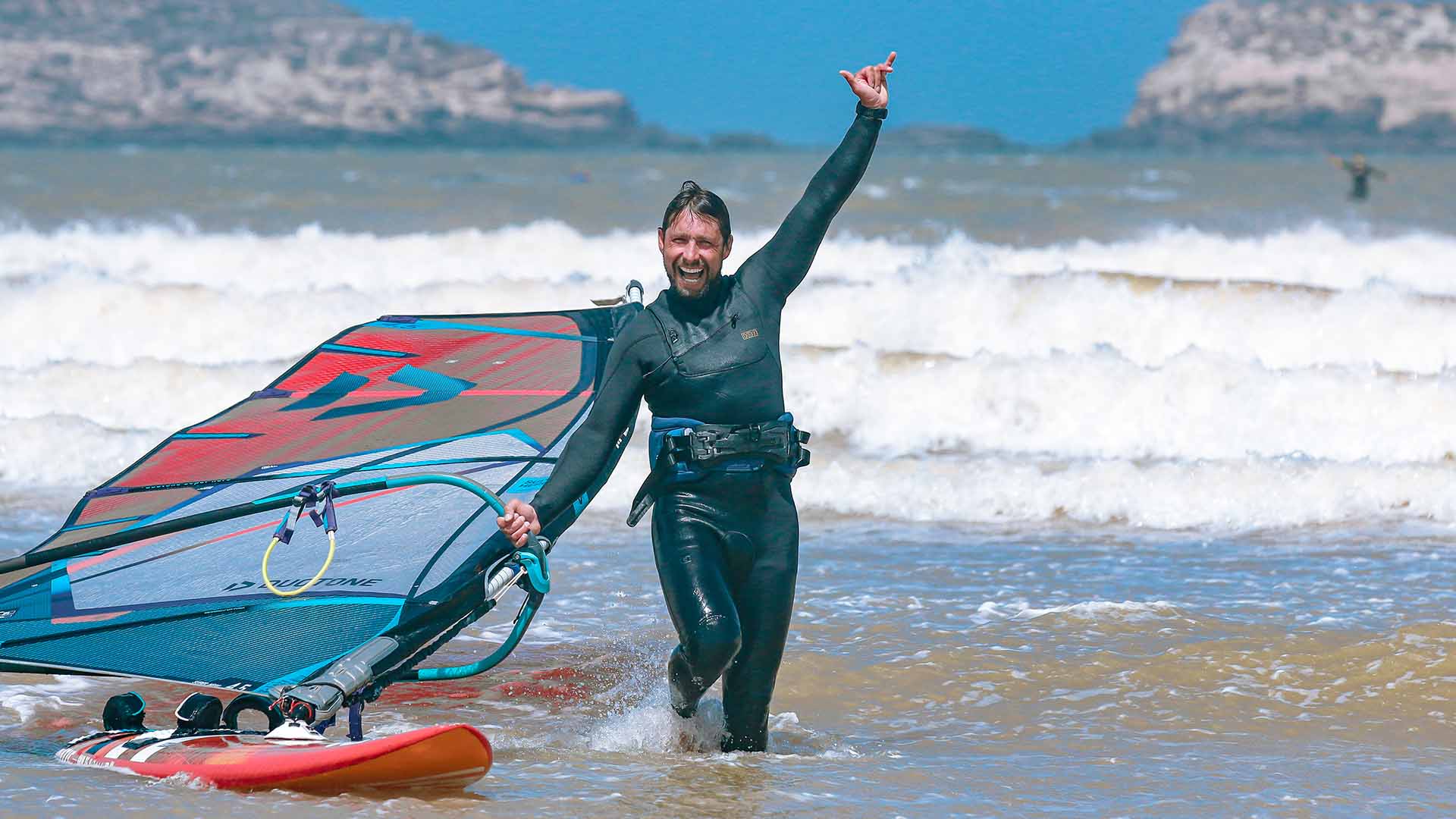
Why start Windsurfing courses?
Are you wondering if windsurfing is the sport for you or for your children? It is, since it’s accessible to everyone no matter what age or level of experience in watersports and sailing. You don´t need to be super sporty. It is a way to understand the wind in all of its states, as well as the marine elements. In short it is a beautiful experience that will allow you to draw from the depths of your resources. You are completely in touch with nature, and of course it is highly recommended to take windsurfing lessons to learn or improve, even if this process will require you to dig deep and immerse yourself fully.
Gliding over the water on a board using a sail as a motor gives you a feeling that you can’t get anywhere else. Today there is stand up paddle boarding which you can use as an approach to perfecting balance, and then why not add a sail to the party! In the last 20 years, windsurfing boards have become very stable because they are larger and wider and adapted to every physique. The sails, masts and booms are also lighter.
Windsurfing is also a safer water sport than kite and wingfoil, and it’s a lot less scary in case of a fall.
What are the different levels of windsurfing?
Windsurfing goes through many different phases, ranging from total beginner who has never set foot on a windsurf board, to those who want to learn planing, water starting and jibes.
Advanced beginners will be offered a board between 160 and 230 litres and a sail adapted to their body size, and usually not too big. The progression in windsurfing will be faster with equipment adapted to your level, so that the slightly more advanced sail on boards that are less and less voluminous and sails that are bigger and bigger. The windsurfer drifts on his first tacks and mostly swims back, so you will have to listen to the advice of your windsurfing instructor to understand the wind and its direction in order to learn how to tack and gybe to turn and return to the starting point. Another basis of windsurfing is the different points of sail, especially the main one, which is sailing upwind.
Of course, you need to memorize everything your windsurfing instructor teaches you, but also regular practice is necessary for positive and fast development. Then comes the beach start and the water start, where you start with your feet on the board or your body completely in the water without the use of the uphaul. Finally the control of the harness to relieve your forearms, and once that skill is acquired its time to get planing, i.e. when the board increases in speed and starts to lift slightly out of the water giving you the most incredible sensations ever. Last but not least you will start to focus on the jibe to learn how to turn without losing speed.
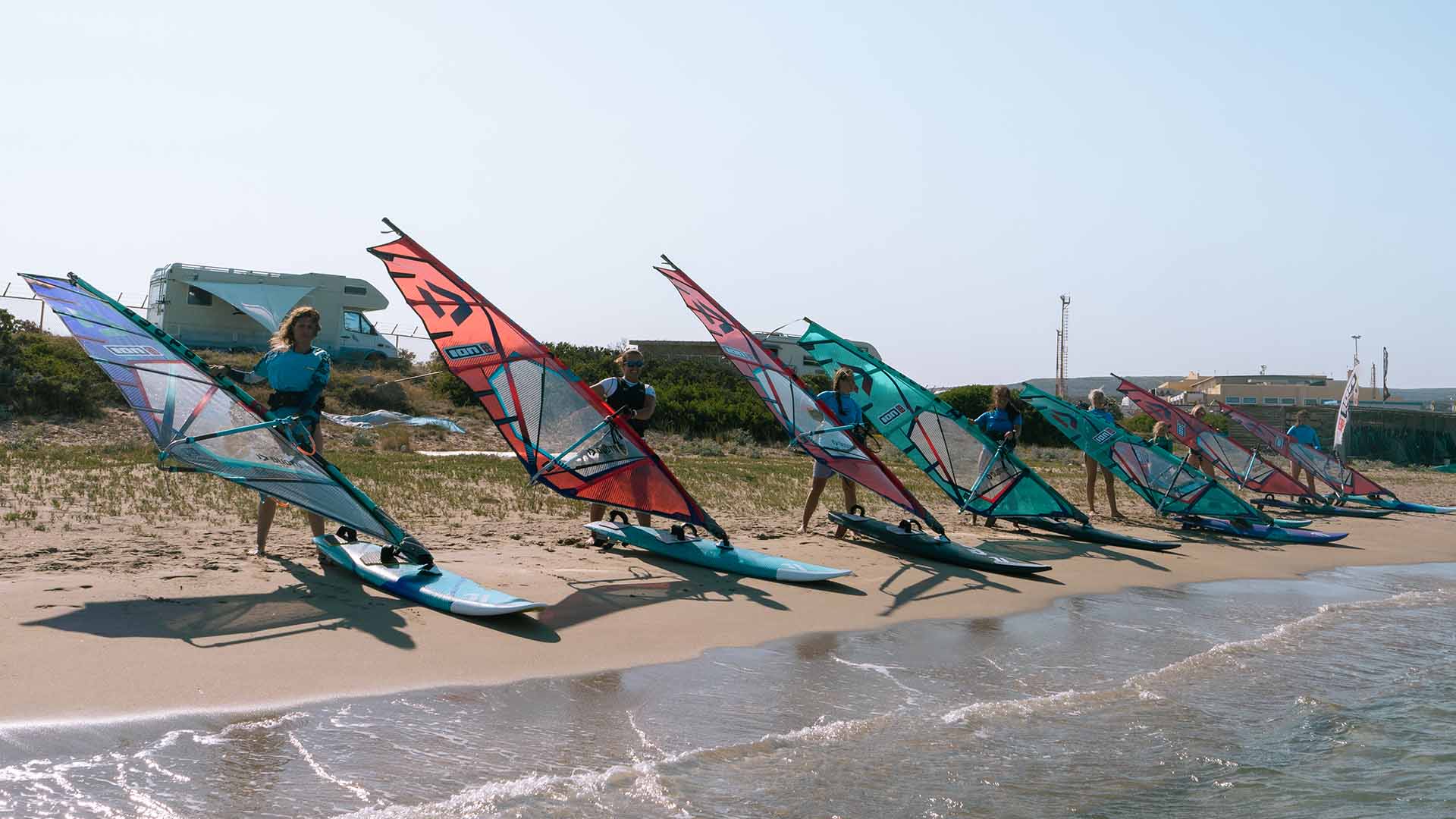
Where to learn windsurfing?
In France, in Europe and in many destinations around the world, windsurfing schools have been established and will always be able to help you start or improve your windsurfing skills. Moreover, the ION CLUB centres have been in place for a long time and offer courses in different formulas such as group or private lessons with recent Duotone equipment : ION CLUB Risco del Paso, ION CLUB Costa Calma, ION CLUB Tarifa, ION CLUB Golf de Roses, ION CLUB Karpathos, ION CLUB Le Morne, ou encore ION CLUB Essaouira ou ION CLUB Sal.
The windsurfing spots are exposed on flat or slightly choppy water, so they are often easy to access. The time of the lessons will be fixed according to your level, the strength of the wind and the state of the sea, i.e. according to the weather.
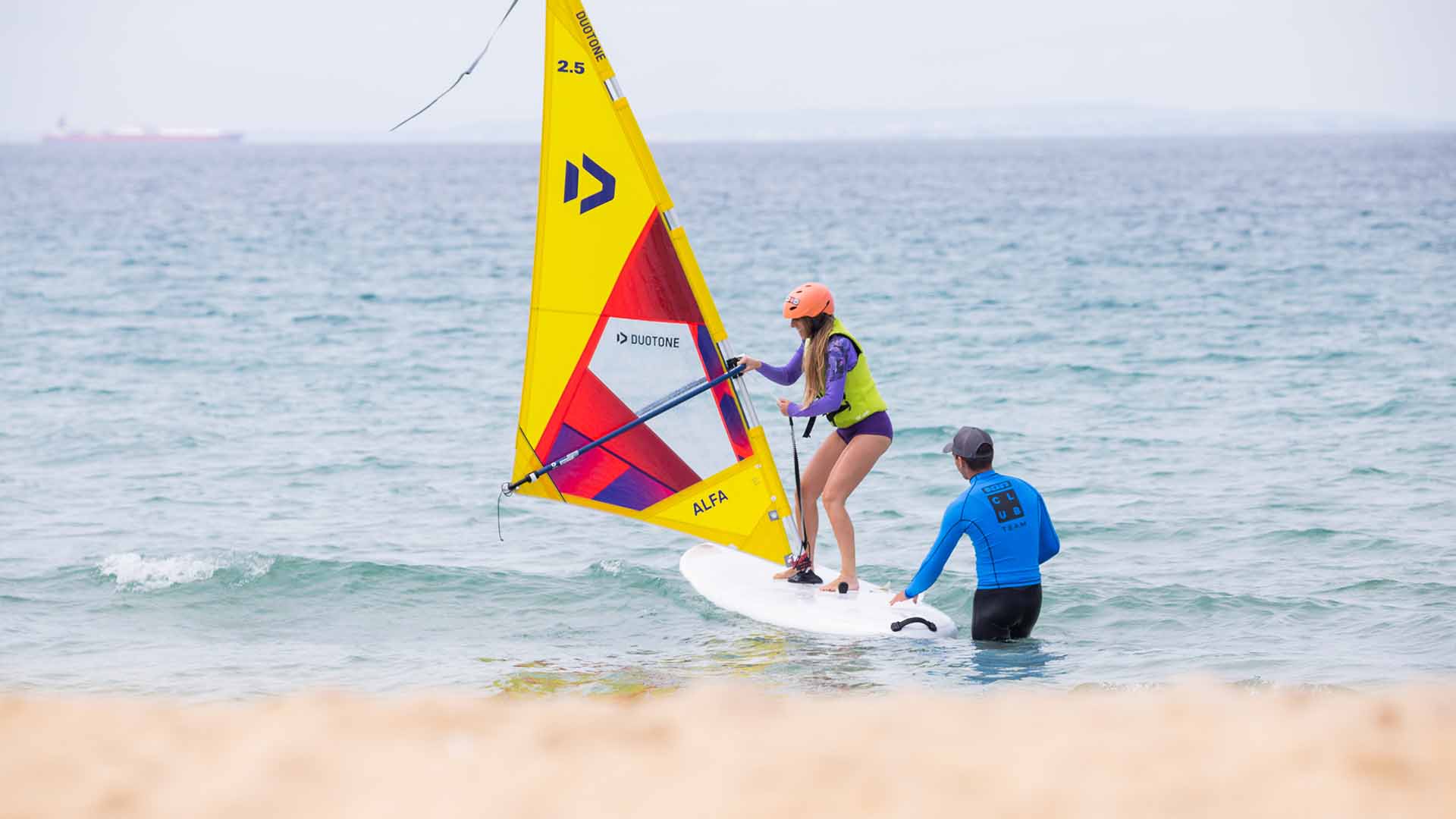
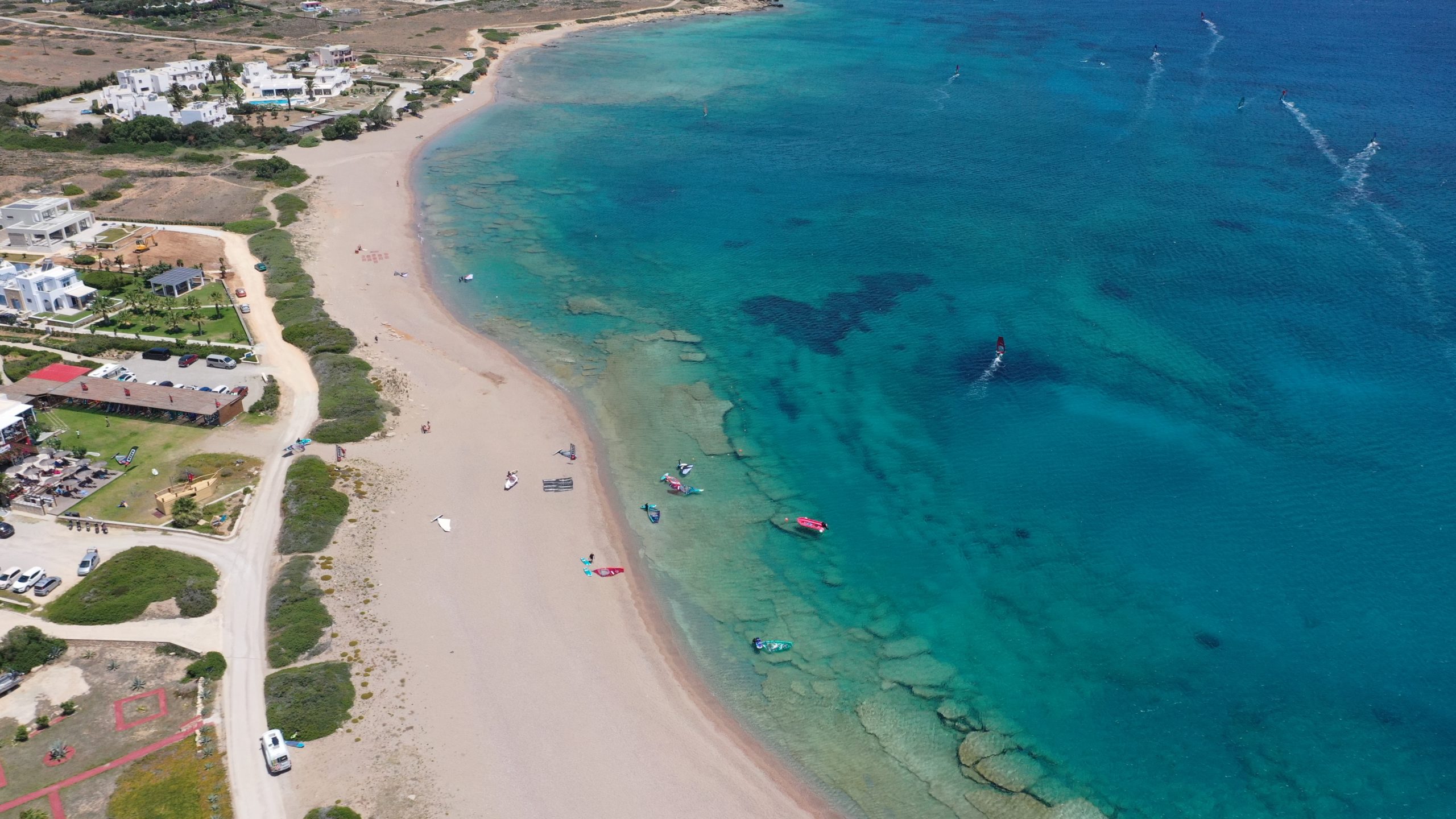
What does a windsurfing course involve?
A windsurfing course always starts with getting to know the equipment you are going to use, and this happens first on land. The wind, the wind, the wind … we can’t say it enough, but it’s your natural engine to move you forwards and steer you in windsurfing. Once you have spent some time on the beach with your rig – consisting of the sail, boom and mast – you will finally go on the water and get your balance on your board. Some instructors will put you on a stand up paddle or a very large windsurf board with a daggerboard without the sail, for a few minutes, in order to find the balance and feel more comfortable once the boom is in your hands. Then it is time to get going, learning to pull your sail in to accelerate by pulling in on the boom, and to slow down by easing off on the boom.
Gradually you will gain confidence and be tempted to go further out to sea. Mastering the tack – turning into the wind – will be necessary to get back to your starting point without losing distance downwind. It is true that gybing (turning away from the wind) is easier than tacking, (turning into the wind) – but you will lose distance. Many beginner windsurfers prefer to gybe because the forward motion keeps you more balanced, but it will then take longer to get upwind.
How much does a windsurfing course cost?
A windsurfing course for beginners of about ten hours, i.e. 5 sessions of 2 hours, costs around 250 euro in group lessons (between 4 and 6 people), and so is much cheaper than kitesurfing and wingfoil. Some schools will also offer private lessons, with a much higher price, and for more advanced levels, such as learning the water start or the jibe, windsurfing packages are also offered for a price of 140 euro for 2 hours, as there are never more than two students.
Windsurfing is still hugely popular as it is such a fun sport … children and adults alike, everyone experiences the feeling of pure gliding in direct connection with nature and the water. Even if you are not yet a world champion or surfing nice waves, windsurfing is a kind of boat in which you are the only captain, and that’s fun!
BECOME AN INSTRUCTOR
CHOOSE YOUR TRAINING GOLF DE ROSES Ready to become a certified instructor and live the dream job? Join ION CLUB for IKO and VDWS certification courses. These instructor training programs prepare you for a career as a kitesurf instructor, giving you the skills...
Kitesurfing Courses in Tarifa: Guaranteed Progression
Why Choose Tarifa for a Kitesurfing Course Located at the southernmost tip of Spain, the kitesurfing spots in and around Tarifa are known for being windy most of the year. With the Levante (dominant east wind), the water along the beaches from Tarifa town to Punta...
The Best Wingfoil Spots in the World for 2024!
The Best Wingfoil Spots, the Rise in Popularity of this sportAppearing on our beaches in 2019, wingfoiling has only grown in popularity since then. Although it is similar to windsurfing and kitesurfing, wingfoiling is certainly less physically demanding than...

